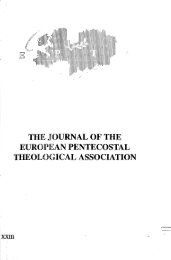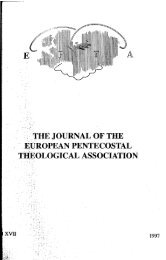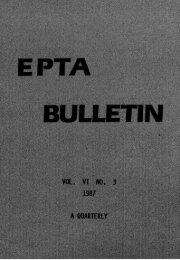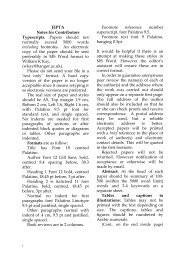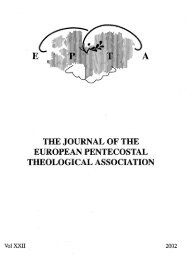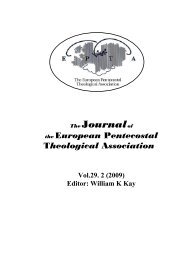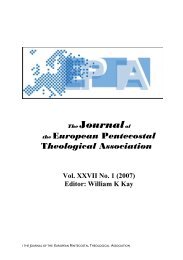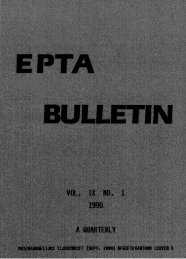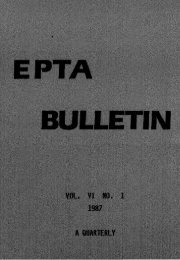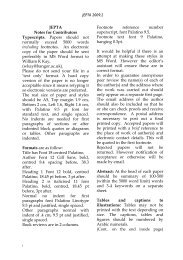jepta 2001 21 - European Pentecostal Theological Association
jepta 2001 21 - European Pentecostal Theological Association
jepta 2001 21 - European Pentecostal Theological Association
Create successful ePaper yourself
Turn your PDF publications into a flip-book with our unique Google optimized e-Paper software.
The Journal of the <strong>European</strong> <strong>Pentecostal</strong> <strong>Theological</strong> <strong>Association</strong>, Vol. XXI, <strong>2001</strong><br />
in the initial evidence or not. However, it could make a difference whether they<br />
practise dealing with Creation in a more spiritual manner as part of their active<br />
sanctification.<br />
The second challenge is the imbalance in world trade. This trade produces too<br />
many refugees and victims. The police will not be able to hold these people<br />
outside the frontiers of Europe. This will create worldwide social unrest. Since<br />
<strong>Pentecostal</strong>s are now in leading positions in the chemical and pharmaceutical<br />
industries, in the military, in industry, in the banks and in the universities, their<br />
voices will begin to count in the future. Why should they belong to those who<br />
destroy God's creation<br />
The third challenge that I see is of a theological nature. What type of theological<br />
method, what manner of doing theology corresponds to <strong>Pentecostal</strong> spirituality.<br />
How <strong>Pentecostal</strong>ism will respond to these challenges is at the moment wide open.<br />
On a personal level, although you began your life as a <strong>Pentecostal</strong>, you left the<br />
denomination; what do you feel is your relationship to mainstream<br />
<strong>Pentecostal</strong>ism<br />
I do not know anybody who could convincingly define what "mainstream <strong>Pentecostal</strong>ism"<br />
i9. Is it French <strong>Pentecostal</strong>ism with its co-operation within the French<br />
Federation of churches or is it Dutch <strong>Pentecostal</strong>ism with its attempts to move its<br />
Bible College not only into geographical vicinity of one of the universities, but<br />
also by integrating it partly into the university Is it Finnish <strong>Pentecostal</strong>ism with<br />
its director of the Bible College being paid by the state and his involvement in the<br />
Roman Catholic/<strong>Pentecostal</strong> dialogue Is it British <strong>Pentecostal</strong>ism with its rather<br />
loose definition of "Spirit baptism" or is it Swiss <strong>Pentecostal</strong>ism that shies away<br />
from all contacts with Catholics, universities and anything which smells of<br />
ecumenism Of course, most <strong>Pentecostal</strong> denominations believe themselves to be<br />
mainstream, but that is sheer propaganda. The <strong>Pentecostal</strong> policeman who<br />
tortured Frank Chikane in South Africa thought that he was mainstream because<br />
he was in line with the dominant apartheid regime in South Africa. Nowadays,<br />
probably most <strong>Pentecostal</strong>s will not see Frank Chikane as being representative of<br />
mainline <strong>Pentecostal</strong>ism. Since <strong>Pentecostal</strong>s do not have a central authority to<br />
decide on who is "mainstream" and who is not, the question seems unanswerable.<br />
As to my personal relationship, 1 always wanted to be a theologian for and with<br />
<strong>Pentecostal</strong>s. Since that was not possible within Swiss <strong>Pentecostal</strong>ism (although<br />
that is changing too), the Lord provided a platform for me within the WCC and<br />
within certain <strong>European</strong> universities, where 1 trained a considerable number of<br />
<strong>Pentecostal</strong> theologians. 1 helped them to be taken serious in the universities and<br />
within the WCC. With time, this has also been recognised by <strong>Pentecostal</strong>s who<br />
invite me to address them regularly. I even received "A Life Time Achievement<br />
Award" for my research from the US Society for <strong>Pentecostal</strong> Studies. The<br />
<strong>Pentecostal</strong>ism, Past, Present and Future<br />
Interview with Walter Hollenweger by Neil Hudson<br />
ceremony took place at the headquarters of the US Assemblies of God, Springfield,<br />
of all places. As to my personal convictions, it is by now probably clear that<br />
together with many <strong>Pentecostal</strong> and non-<strong>Pentecostal</strong> scholars, I feel that many of<br />
their propositional statements are to be found wanting. However, <strong>Pentecostal</strong><br />
theology is changing so rapidly now, at least on the academic level, that I do not<br />
want to stress this point.<br />
As in all churches, the denominational hierarchies are way behind their scholars.<br />
But that is not only a problem within <strong>Pentecostal</strong>ism.<br />
Globally, <strong>Pentecostal</strong>ism has become a southern-hemisphere religion. What<br />
does that mean for the development of <strong>Pentecostal</strong> scholarship in the future<br />
What do you feel will be the emphases that this shift will introduce into<br />
mainstream <strong>European</strong> <strong>Pentecostal</strong>ism<br />
Firstly, the times of <strong>European</strong> <strong>Pentecostal</strong> missionaries in the Third World are<br />
over. Third World <strong>Pentecostal</strong>s are better missionaries and evangelists in their<br />
own culture than any <strong>European</strong>. The sooner <strong>Pentecostal</strong> mission societies realise<br />
this, the better. Secondly, <strong>Pentecostal</strong> missionaries must concentrate on Europe,<br />
on the masses of people who know nothing of Christ. But they must also<br />
evangelise the institutions in Europe such as our big commercial enterprises and<br />
our universities that act as if there was no God, even if some of their leading<br />
managers are believing Christians.<br />
Thirdly, in Paris, there are hundreds of African <strong>Pentecostal</strong> congregations. The<br />
same is true for Belgium, England, Germany, Holland and even Switzerland.<br />
Many of these immigrants are not Muslim but <strong>Pentecostal</strong> Christians. So far, the<br />
relationships between these "exotic" <strong>Pentecostal</strong>s and <strong>European</strong> native<br />
<strong>Pentecostal</strong>s are very weak; practically non-existent. The historical churches in<br />
Europe seem to be much better in establishing contacts. Perhaps a <strong>Pentecostal</strong><br />
mission society or a <strong>Pentecostal</strong> missiologist can explain why that should be so<br />
The second generation of these immigrant <strong>Pentecostal</strong>s will appear in our<br />
universities. They will become leaders not only in their immigration communities<br />
(and evangelise them); they will also become partners of the State, the<br />
educational institutions and the media. That will shake <strong>European</strong> <strong>Pentecostal</strong>s!<br />
All of a sudden, black and brown Christians will represent <strong>European</strong><br />
<strong>Pentecostal</strong>ism in public, because white <strong>European</strong> <strong>Pentecostal</strong>s in general choose<br />
to remain 'invisible'. Already, the only <strong>Pentecostal</strong> member church of the<br />
Conference of <strong>European</strong> Churches is a black British <strong>Pentecostal</strong> Church. With a<br />
few exceptions, <strong>Pentecostal</strong> member churches in the WCC are Third World<br />
Churches; many of them African. It is therefore not astonishing that the public in<br />
general will identify <strong>Pentecostal</strong>ism with non-white Christianity.



